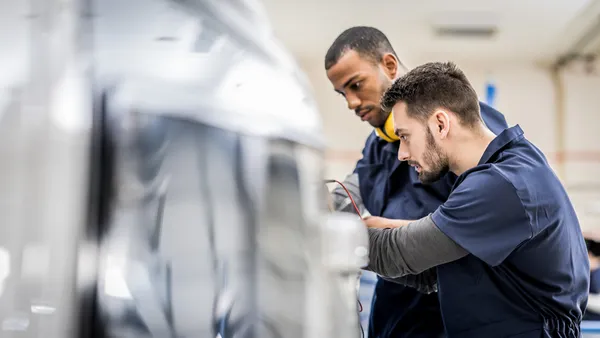Feelings of isolation and detachment due to COVID-19's lockdown orders affect people at all levels of a company. But that loneliness can be exacerbated for early-in-career new hires. Casual conversations with desk neighbors are replaced with Slack messages. Pandemic-era hires look forward to virtual conventions instead of business trips. Direct reports can't quite poke their heads into a boss' office to chat — they'll just have to check their Google Calendar instead.
"We have seen people getting creative with Zoom mentorship experiences or even phone calls. But that ability to take someone to coffee off-site of where you're working, or take them to a networking event with you? We've had to put that on pause," Amy Contreras, head of learning, engagement, and development at Uber Freight, told HR Dive. While restrictions are lifting and old-school mentoring will soon be possible, L&D pros will be faced with navigating a hybrid workplace where some employees will remain fully remote.
"Think about all the people who've been hired [who have] never seen the physical space. They've never actually met any of their co-workers in person. It can be a very narrow experience to only meet the people who you interact with directly because of the work," she said. Something Contreras has implemented to shake up pandemic-era employee development is a new-hire buddy program. Employees who've worked at Uber Freight for six months or longer show new hires the ropes. Contreras also asks these mentors to introduce their hires to at least three other people so that mentees can broaden their network.
Jobs for the Future's Cat Ward, who manages JFF's Corporate Action Platform and Advisory Services practice, also encourages employers to create an expanding network for new hires. "People working remotely may feel a bit more estranged from the environment. Mentoring can be a really important way to help people build professional social capital, help them develop a team of allies, and help give them a sense of career navigation and the norms for navigating through the internal dynamics and politics," Ward told HR Dive.
A tool Contreras recommends for on-the-job mentoring is Kronos, a platform also used by Waste Management, Tesla, PUMA and MGM Resorts. Uber Freight employees who want to be mentors can register through this software and tick off whether they're available for a one-time conversation or an ongoing mentor-mentee partnership.
Additionally, Uber and Uber Freight have seen success with group mentoring, Contreras said. "A single, more experienced leader — someone who has great knowledge to share — has a coffee chat or a roundtable mentoring experience," Contreras said. "That's worked really great as well and people have gotten a lot out of that."
L&D coordinators, keep in mind: It can be particularly helpful if the mentors, not just the mentees, are asking questions during one-on-ones. Selena Rezvani, a LinkedIn Learning instructor and women's leadership speaker who has mentored young professionals for 12 years, helps mentees shape their present and their future this way. "I don't know what's right for them after all. That's their hard work to do," Rezvani said in an email. "I see a big part of my job as asking them provocative questions. ‘What's is the absolute best thing that could come of that opportunity? What conditions need to be true for you to do X? What would making that move do for you? What's the absolute worst that could happen?'"
A thematic thread of the pandemic has been candid dialogue about mental health and well-being. Sarah Sheehan, co-founder of coaching platform Bravely, noticed an uptick for guidance at the intersection of career and mental health. "We've seen huge spikes in sessions around stress and burnout. What I think has been incredibly interesting is that those same people — talking about these feelings surrounding stress and burnout — they're also talking about their desire to continue to grow in their role or get to the next level in their career," Sheehan told HR Dive.
"In these moments where we may not know how to get to the other side, or feel less stress or burnout, it crystallizes for us how important our jobs are — or how important the focus is for us to get to the next level," Sheehan said. "It's the feeling of, ‘I don't want to slip or fall behind. I don't want what's happening to me to have a negative impact on my career is not the focus of those symptoms.'"
In regard to holding space for mentees' mental health during the pandemic, Rezvani asks questions like, "Where are you drawing work boundaries for yourself? How are you taking care of yourself? Are you making sure you're seen and heard in this more remote environment?" Ultimately, she encourages her mentees to keep negotiating for their needs and wants.
"We retract during times of change, working quietly with our heads down and playing it safe. I tell mentees that, in fact, times of change are an excellent time to negotiate for a new role, new project or new leadership opportunity. As long as you can tie it to how it will help your organization get to or adapt to the destination they're headed, you can and should ask for things," Rezvani said. "If anything in times of change, people are looking for solutions and leadership and often, nothing is written in concrete yet."














